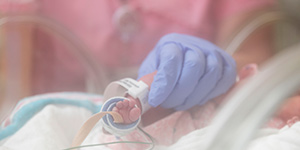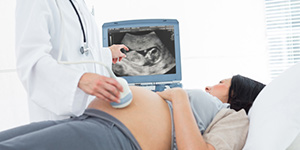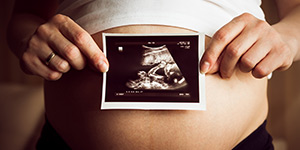High Risk Obstetrics at GBMC
Comprehensive care for pregnancies involving a danger to the mother's health or health of the fetus
For women needing close monitoring during pregnancy, our 18 bed Labor and Delivery Department provides specialized maternal-fetal care. It's one of the only in the region that consolidates all prenatal services including inpatient care, and antepartum testing in one location to promote a seamless continuum of care.
Birthing room amenities include:
- Soft natural lighting and low sound design
- Private bathroom
- Comfortable sofa that converts to a sleeping space for your significant other
- Flat screen television
- Wireless Internet access
- Side-rail patient bed control pendant for the TV, lights and bed
- A patient information board is provided that includes the names of your care team and pertinent telephone numbers for your convenience
Our Services
The High-Risk OB Unit is devoted to the superior care of the mother who needs to be admitted prior to delivery. Using state-of-the-art monitoring equipment, specially trained nurses bring peace of mind to patients. Here, too, dietitians, physical therapists, and other professionals work together to promote healthy babies.
High-risk obstetricians, perinatologists (high risk obstetricians), intensivists and neonatologists work together to ensure the healthiest outcomes possible. The unit is adjacent to the Labor and Delivery Suite, for immediate transfer if necessary.
Frequently Asked Questions
What is a high-risk pregnancy?
A high-risk pregnancy is one that involves a danger to the mother's health or health of the fetus, which can include previous problem pregnancies, pregnancy of more than one baby, and being over the age of 35.
What is Gestational Diabetes?
Diabetes is a disease in which your blood glucose levels are too high. When pregnant, too much glucose is not good for the baby. Gestational diabetes is diabetes that first develops during pregnancy, and typically goes away after the birth of the baby. However, it may increase the risk of developing diabetes down the road.
What are some common conditions that can complicate a pregnancy?
Some common conditions known to complicate pregnancy are:
- Heart Disease
- Autoimmune Disorders
- Diabetes
- High Blood Pressure
- Kidney Problems
- Sexually Transmitted Diseases
- Cancer
Related Services

NICU - Neonatal Intensive Care Unit
6701 N. Charles St.
Main Hospital, Unit 37 - 3rd floor
Towson, MD 21204
Phone: (443) 849-2591

Prenatal Genetics
6701 N. Charles St.
Main Hospital, Suite 2310
Towson, MD 21204
Phone: (443) 849-2536

OB/GYN - Perinatal Associates
6565 N. Charles St.
Pavilion East, Suite 406
Towson, MD 21204
Phone: (443) 849-2568

Labor and Delivery at GBMC
6701 N. Charles St
Main Hospital
Towson, MD 21204
Phone: (443) 849-2597



